
- Kym Balthazar
When a real estate listing appeared for the building that occupies 118 Main and 7 School Streets in Montpelier, Vermont's culinary community took note. The listing described a "landmark" investment where cash was flowing. With an asking price of $950,000, the property represented a "rare opportunity" to own a key piece of Vermont's capital city.
It's an equally key piece of Vermont's reputation as a foodie haven. The building is fully leased by the New England Culinary Institute (NECI), the once-thriving for-profit school that has made headlines in recent years — including in a 2014 Seven Days cover story — because of its struggles.
Late last month, a new owner closed on the 16,000-square-foot building for an undisclosed sum. Chatting with Seven Days via phone last week, Milan Milasinovic, who took over as president of NECI in spring 2016, said he'd received a letter from the new owner's attorney "saying that there's been a change in ownership. The letter gave instructions on where to send the rent, but other than that," he said, "I don't know what's going to happen." He hoped the new landlord would "keep us in [the building]," he added, "but I don't know."
When Milasinovic, who declined to give his age, joined the college, the lease was just one of the uncertainties swirling around the school, which had been struggling with declining enrollments and cash-flow issues for many years. "I guess I arrived here a minute before midnight," Milasinovic said during an interview in June, seated in an undecorated second-floor office at NECI, "because they were just about to close [the school] last spring."
Tall and well groomed, NECI's president was clad in a blue-black suit with subtle pinstripes. He carried himself with casual confidence, his polish a contrast with the drab, off-beige walls. A week or so earlier, the school had announced a merger with Lakewood, Ohio-based Virginia Marti College of Art and Design, where Milasinovic is also president. Joining the two schools, he argued, would enrich both programs while cutting administrative costs.
Locally, however, the announcement raised more questions than it answered. What would the merger mean for Vermont's preeminent, if beleaguered, culinary school?
Fran Voigt cofounded NECI in 1980 with his wife, Ellen Bryant Voigt, and partners John Dranow and Louise Glück. The school grew quickly, eventually reaching an enrollment of 800 students in 1999. In 1986, Voigt and co. annexed a campus in Essex Junction (now the Essex Culinary Resort & Spa); in 1997, they added NECI Commons, a restaurant on Burlington's Church Street Marketplace. Alumni climbed to executive positions in America's top restaurants.
But, by the early 2000s, trouble was brewing. Enrollments dropped, NECI Commons closed and the school sloughed off its Essex Junction campus. Management fractured and split, leaving the Voigts as sole owners. Then Fran Voigt fell ill. NECI ran through several presidents between 2010 and 2016.
Some of NECI's problems were circumstantial to the school. But others are currently epidemic in American food education. During the Obama era, the federal government tightened regulations regarding education funding for for-profit career schools. That made it harder for institutions such as NECI to budget for nonstandard expenses, including operating commercial kitchens, purchasing ingredients and other restaurant-industry liabilities.
Attracting and retaining students became harder, too. Tuition for a four-year NECI degree costs about $84,000, near the national average for a culinary school. Housing and other expenses can total $15,000 to $20,000 per academic year. Facing high debt loads and meager entry-level wages, many students opt to drop out or seek culinary education in less formal settings.
Enter Milasinovic — who, over the past several years, has built a career out of changing the fortunes of small, private, career-focused institutions. Born in what is now Croatia and educated in Italy, Milasinovic worked in fashion merchandising and marketing for a decade. After earning a doctorate in business administration from Florida's Nova Southeastern University in 2003, he entered academia. Since then, he has worked as faculty, department head and dean at various institutions, and developed graduate programs at LIM College of fashion and business in New York City and London's European School of Economics.
In 2015, Milasinovic took over operations of VMCAD as school founder Virginia Marti approached retirement. She wanted to hand the college to someone who could expand its programming in a way that would set it on sound financial footing, he said. Marti transferred school ownership to him earlier this year, though he wouldn't specify whether he remains the sole owner.
In a series of recent interviews with Seven Days, NECI's new president described how he came to lead the Vermont school and restore it to financial health. He also outlined the plans — for curriculum, campus siting and more — that he believes will allow NECI to grow and thrive in today's economy.
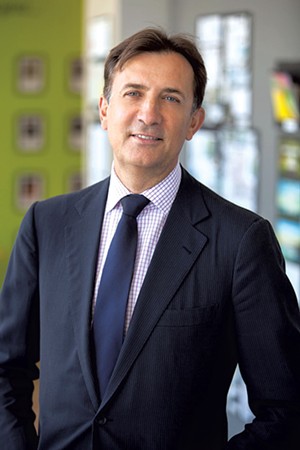
- courtesy of Milan Milasinovic
- Milan Milasinovic
SEVEN DAYS: How did you become involved with NECI?
MILAN MILASINOVIC: One day a year and a half ago, our auditor [in Ohio] came in and said, "There is a school in Vermont that is having some financial issues." He asked if I would be willing to come and take a look. So I did, and [it was] another challenge, and I like challenges.
SD: So, you come to Vermont in the dead of winter, and here's this school barely surviving at a time when culinary schools all over the country are closing. Why get involved? What opportunity did you see?
MM: The opportunity was to turn around the school, to save the school. Personally, it's my career. Succeeding in a venture like this goes far, and it gives me better skills and allows me to grow. And, at the end of the day, seeing students succeeding is a great thing.
I'm not super driven by money — I didn't receive any salary, not a penny here for [the first] year. I'm thinking of going nonprofit with both of the schools in a few years.
SD: Are you now one of the owners — or the owner — of NECI?
MM: In education, if you want to merge two schools, that would basically give birth to a third school, which is impossible. So we presented this case as an acquisition. The Ohio-based school bought NECI. But it didn't buy it like you would expect, with a stash of money or something like that. It bought it by incorporating a subsidiary in Vermont, which is 100 percent NECI. So NECI kept its identity, address, people, everything.
The owner of the school is the [Ohio] college, VMCAD. But, in reality, it is a merger, because NECI probably has more resources than the other school, in terms of human resources and stuff like that. The other school is also small.
SD: With this acquisition, was money transacted?
MM: We were required by the Department of Education to exchange some money, but it's symbolic. It is not really money. And the [Voigts] didn't get any money out of it ... They just retired. They were just happy that somebody saved the school. They have their retirement through us, but that's a different thing.
SD: Are they still involved at all?
MM: No. ... I take their advice all the time. But they're not formally advisers.
SD: What does this VMCAD-NECI merger mean for the schools' operations and programs?
MM: We are sharing finances, and people from NECI are managing Ohio-based finances and IT ... On the other hand, we have liberal arts and business courses at the school of art and design, so we're sharing the online courses with NECI students. NECI doesn't have to design new courses and get new faculty, because it's all already there. So, there are a lot of synergies. And, clearly, a lot of savings in sharing resources.
SD: As far as programming goes, where do you see opportunities to put NECI ahead of the curve?
MM: We already offer the highest [culinary] degrees [available], which are four-year BA and BS degrees. We've completely changed our curriculum to a semester system and added new courses emphasizing nutrition. So we are already ahead of the curve in many ways.
But otherwise, NECI has three components. Everybody knows about culinary and baking, but the food and beverage business management is just pure management. In the past, that component was treated as [front-of-house] management — restaurant management. So, I see the future in elevating that [program] to the executive level of the food and beverage industry. I want to educate people who are passionate about the industry but knowledgeable in business.
SD: How do you plan to do that?
MM: The way to do that is by creating businesspeople with hands-on culinary and baking experience. I'm planning to elevate [the management program] to the MBA level. My next step would be to [create] an MBA in the food and beverage industry. That's our plan for the next couple of years, and I think that's going to set us apart.
Plus, all of our programs are offered in residential and online [versions].
SD: Do you see the MBA program as a potential enrollment booster?
MM: Enrollment [issues] hurt everybody right now, but I want to stay small. Right now, we have 200 to 250 students, including online students. Our plan is to grow back to maybe 350, and that's all.
SD: And you can make the school's finances work with those numbers?
MM: Yeah, I can. I have to fix the restaurant [NECI on Main], and we're working on that. But we already fixed [the school's finances overall]; we're already profitable. We just finished our first fiscal year [since I got here]. This is our first year being profitable [in a long time]. It's a very small profit, but it's not a loss.
SD: What steps did you take to return NECI to profitability?
MM: Turnaround is a comprehensive thing composed of many elements. One is to streamline processes, identify redundancies that waste resources, make them less expensive. NECI was filled with those processes.
There was huge disorganization, processes not well designed and streamlined. So we put things together and reorganized teams of people. I brought in new people, let go of other people; emphasized [looking at] profits and losses and revenue-generating activities.
The restaurants were losing money. So I had to turn around the number of people, the food-purchasing process, the opening hours, and manage things to incentivize people.
We had things like paying a lease to a landlord that was completely out of whack. The lease was current 11 years ago, before the financial crisis. No one had renegotiated the lease. [Note: NECI leases its building under an absolute triple-net lease agreement, which means the tenant pays all building-related expenses, including property taxes and maintenance.]
On the education side, it was emphasizing enrollment and student accounts and aid; we hired collection agencies [to go after delinquent accounts]. The finance and accounting offices were a complete disaster. We didn't have an HR office or an employee handbook. We had faculty teaching without any degrees. So we had to fix all of that.
SD: What about the campus? Do you plan to stay in Montpelier?
MM: That's the perennial question I'm getting every day. What I think you should know is that this building was owned by a landlord who decided to give the deed back to the bank ... Now I hear that the building has been sold, so I don't know how long we can stay here. We have a 10-year lease with a one-year notice both ways. So, [the] new owner can kick us out with one year's notice. And I would have no place to go.
SD: Where would you like to go, if you could choose anywhere?
MM: I don't think that colleges should have landlords; colleges should not be exposed to these kinds of transactions, because we have education to think about, not banks and landlords and stuff like that. So, wherever we end up, I think we need to build our own campus. That's my primary goal. If I tell you how much money we spent in the last 10 years on the lease here, you would just laugh.
SD: OK, how much did you spend on the lease?
MM: $4.5 million. In 10 years. For two buildings that together are appraised for less than $2 million. So, in 10 years, we've paid double the value of the buildings.
SD: I read in another local news outlet that NECI was leaving Vermont.
MM: The reporter who wrote that really rubbed me the wrong way — this whole thing about culinary programs in Cleveland, that's our expansion. That's in addition [to Vermont]. That's not that NECI is moving. NECI is Vermont, and it will stay in Vermont.
I like it here. The nature is beautiful, and Vermont's whole-food branding is very strong. And NECI is a part of that. The brewers and the cheesemakers and the maple syrup — this place has a lot to offer.
SD: Have you looked at the Burlington College campus?
MM: We have looked at Burlington College. The developer approached us and said he wanted NECI to be there, but the price was about $16 million to buy it. I don't have that.
SD: What kind of community would you like to land in? What kind of place would be best for your students?
MM: We are working on a few approaches. One could be a farm, which could be in the middle of nowhere. We would plant crops, keep animals, with a lot of land. So we're exploring that. It's that or a city campus.
If it's a city campus, then, clearly, it would have to be where the city is. So, Montpelier or Burlington, something like that. But you understand, to build our own campus requires a lot of money, and we don't have it. So it's not an easy thing to do.
SD: Why are people so attached to the idea that NECI remain in Montpelier?
MM: That's a very good question, and I have no answer to that. In my experience, people are so afraid of the idea that NECI might leave. I don't know if there's an emotional factor in that. What I do know is that right now we are paying about $38,000 a year in real estate tax on a building that was appraised for $700,000. I don't see any break in real estate taxes. We don't have one parking place. We have hundreds of students.
If the State of Vermont [or] the City of Montpelier [is] willing to build us a campus and they own it, I am ready to lease it from the city or the state. I'm not ready to lease from any landlord, but if the city is willing to invest and build, I'd be happy to stay here. And I can increase the enrollment, and we can live happily ever after together.
NECI Cooks For Veterans
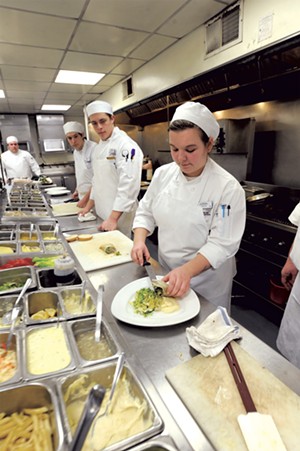
- Jeb Wallace-Brodeur
- NECI students
At New England Culinary Institute, culinary arts department chair Jim Birmingham usually works with young people. They arrive open-eyed, ready to lean in as he demonstrates how to cut a perfect, thin fillet of fish or whisk up a roux.
But, during a months-long course at the White River Junction VA Medical Center that wrapped up in June, Birmingham had to adjust to a new kind of cook. "A lot of the cooks have been here 20, 30, 40 years," he said, removing his tall paper chef's hat to sit at a round table just off the VA kitchen. "So, they're not as susceptible to training."
Birmingham first visited the VA in January, working to develop a program in collaboration with Nancy Romano, then food service and nutrition chief. Romano hoped to fund the program with a VA innovations grant, and the two designed it to help the VA's cooks in White River improve their kitchen skills, prepare nutritious food that tasted better and, ideally, advance their careers.
When the expected grant fell through, NECI president Milan Milasinovic decided to provide the $38,000 worth of instruction and programming free of charge. Milasinovic's wife is a VA physician; the couple's two young children attend preschool at the VA campus in Manhattan where she works.
"I was personally very interested in this because I think it's a noble thing to do," he told Seven Days in June. "We should really be taking better care of our veterans."
Each dish served at the VA must accommodate the myriad dietary needs of patients who might be suffering from high cholesterol, hypertension, diabetes, anemia, post-op infections or other conditions. Recipes are strictly regulated. Usually, adding a half-cup of sugar to liven up a dessert isn't an option.
"It surprised me how difficult it is to change a recipe," Birmingham said. "You have to see if the nutrition works. Submit [it] to [the] dietitian. Then you have to change the menu [in the VA culinary database]. And then you have to get someone who's worked here for 40 years to make mac-and-cheese in a different way. There are no quick pivots."
But, even as workers had to cook to the book, Birmingham spent time reworking formulas for common entrées. "It was more about 'What can we do differently that makes it taste better?'" he said. "It's not that you have to change the ingredients, but asking instead, 'How do we get the most out of this recipe?'"
Most of the tweaks were procedural: To beef up the flavor in a stew, Birmingham instructed the staff to brown the veggies first before adding them to the meat and stock. The new procedures were often more work, he acknowledged. But in kitchen taste tests, everyone — old-timer cooks and service staff alike — agreed that the reworked recipes tasted better.
Whether the teaching will stick in an environment where most workers come to punch the clock remains to be seen. "The cooks say, 'We love to serve the veterans,'" Birmingham said. "But when opportunities come up to improve [the service], it's 'We're going to protect our break time.'"
Even so, VA administrators are looking at how to replicate the program at other hospitals, including the one in Manchester, New Hampshire, where Nancy Romano now works. And the program was selected for presentation at the VA's annual Improvement & Innovation Summit, which takes place in September.
Still, he's hopeful that some of the more time-saving, skills-based lessons will take root. "The food will taste better, and the [vets] will enjoy it more," he said. "And you're going to be more efficient. Your work day is going to be a lot easier with that efficiency."
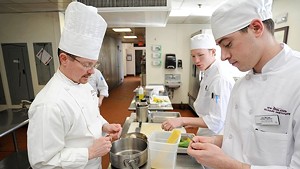
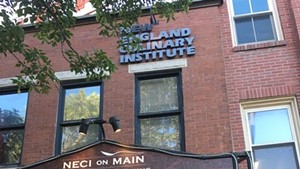

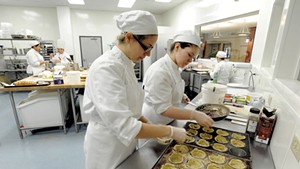
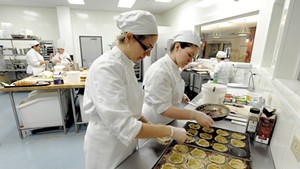









Comments
Comments are closed.
From 2014-2020, Seven Days allowed readers to comment on all stories posted on our website. While we've appreciated the suggestions and insights, right now Seven Days is prioritizing our core mission — producing high-quality, responsible local journalism — over moderating online debates between readers.
To criticize, correct or praise our reporting, please send us a letter to the editor or send us a tip. We’ll check it out and report the results.
Online comments may return when we have better tech tools for managing them. Thanks for reading.